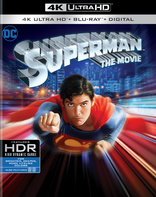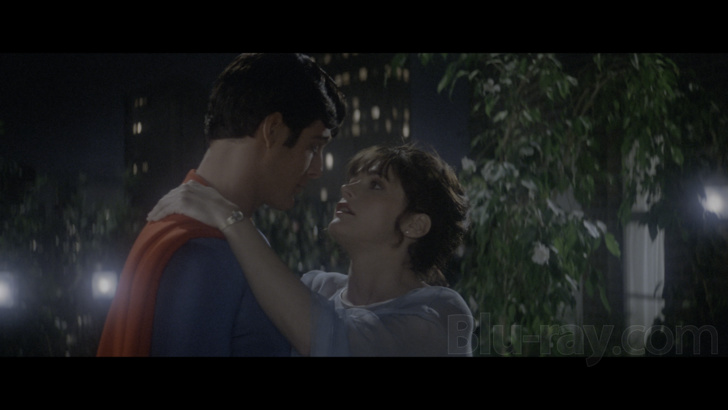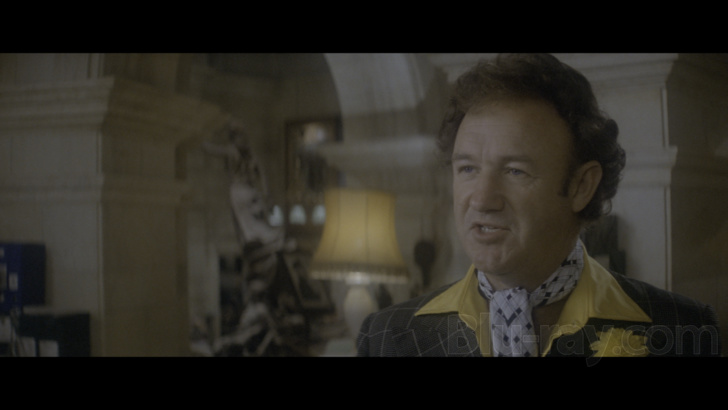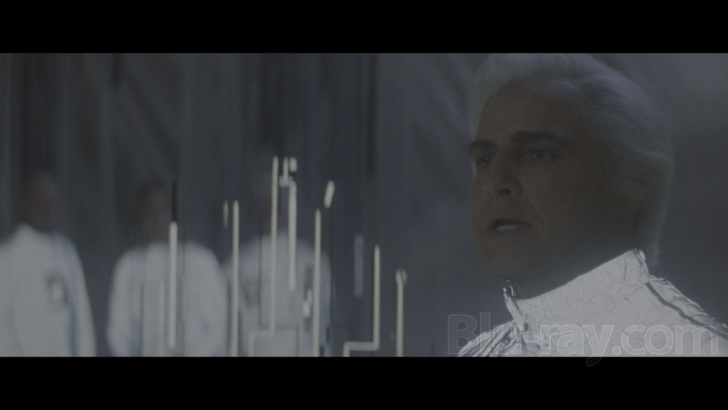Superman: The Movie 4K Blu-ray Movie
HomeSuperman: The Movie 4K Blu-ray Movie 
4K Ultra HD + Blu-ray + Digital CopyWarner Bros. | 1978 | 143 min | Rated PG | Nov 06, 2018

Price
Movie rating
8.1 | / 10 |
Blu-ray rating
| Users | 3.8 | |
| Reviewer | 4.0 | |
| Overall | 3.8 |
Overview
Superman: The Movie 4K (1978)
The enduring adventure spanning the Man of Steel's life, from his Krypton infancy and Midwest boyhood to his career as Daily Planet reporter Clark Kent, and through his titanic struggle with archnemesis Lex Luthor.
Starring: Christopher Reeve, Margot Kidder, Gene Hackman, Marlon Brando, Ned BeattyDirector: Richard Donner
| Action | Uncertain |
| Adventure | Uncertain |
| Sci-Fi | Uncertain |
| Comic book | Uncertain |
| Fantasy | Uncertain |
Specifications
Video
Video codec: HEVC / H.265
Video resolution: 4K (2160p)
Aspect ratio: 2.40:1
Original aspect ratio: 2.39:1
Audio
English: Dolby Atmos
English: Dolby TrueHD 7.1 (48kHz, 24-bit)
English: Dolby Digital 5.1 (640 kbps)
French: Dolby Digital 2.0 Mono
Spanish: Dolby Digital 2.0 Mono
Spanish: Dolby Digital 2.0 Mono
German: Dolby Digital 2.0 Mono
Italian: Dolby Digital 2.0 Mono
Portuguese: Dolby Digital 2.0 Mono
Japanese: Dolby Digital 2.0 Mono
Both Spain & Hispanic American dubs; Japanese is hidden
Subtitles
English SDH, French, German SDH, Italian SDH, Japanese, Portuguese, Arabic, Czech, Danish, Dutch, Finnish, Korean, Mandarin (Traditional), Norwegian, Swedish, Thai
Discs
Blu-ray Disc
Two-disc set (2 BDs)
Digital copy
4K Ultra HD
Packaging
Slipcover in original pressing
Playback
Region free
Review
Rating summary
| Movie | 4.0 | |
| Video | 4.5 | |
| Audio | 4.5 | |
| Extras | 3.5 | |
| Overall | 4.0 |
Superman: The Movie 4K Blu-ray Movie Review
Still Flying After Eighty Years
Reviewed by Michael Reuben November 8, 2018I began my Death of
Superman
review by asking how many times Warner and DC Comics could
get away with killing off the Man of Steel. An equally valid question is how many times they can
get away with reissuing Richard Donner's 1978 Superman: The Movie, even if it is the one that
started it all. It was Donner who first demonstrated how to give hand-drawn characters a
convincing live-action presence as they performed impossible feats on the big screen. Without his Superman,
there would be no DC
Universe (live, animated and TV) and probably no Marvel Cinematic Universe. Filming styles and narrative expectations have
evolved and
diversified over the last four decades, but Donner's Superman retains the distinction of being the
first in a long and (so far) continuing line of comic book tent-pole movies.
Warner has chosen Donner's film to round out its meager selection of catalog titles promoted to
UHD in 2018. (The others are the three
Matrix
films and Stanley Kubrick's landmark 2001: A
Space Odyssey.) It's an odd choice, motivated in large part by the fact that 2018 is both the 40th
anniversary of the film and the 80th anniversary of the character's first appearance in Action
Comics #1. Still, it isn't as if Donner's film has been ignored on the Blu-ray format. It was an early addition to
Warner's initial
offerings in 2006; it was included, in two versions,
in the 2011 Superman
Motion Picture Anthology; and just this year its extended TV cut was
issued by the Warner Archive Collection, which included a copy of the "Expanded Edition"
created for DVD in 2000 with Donner's participation and then brought to Blu-ray in the
Anthology.
Confused? Who wouldn't be? Well, now there's yet another version: a UHD containing the
theatrical cut of Superman: The Movie originally released in 1978, newly scanned from the
camera negative, color-corrected and graded in HDR and Dolby Vision. With a few minor
tweaks—and a new Atmos sound mix—this is the version that made the late Christopher Reeve a
movie star and fulfilled the ad campaign's promise: "You will believe a man can fly!" The UHD
package also contains a copy of the theatrical cut's 1080p Blu-ray that Warner included in the
2011
Anthology, with the extras that accompanied the film's initial DVD release.

Blu-ray.com has previously published discussions of Superman: The Movie by Greg Maltz, Kenneth Brown and Josh Katz (twice). The interested reader may refer to any or all of them for an overview of the film and analysis of its importance. Even after all these years, I watch Superman with great affection, remembering the excitement of seeing it theatrically in 1978 and the delight of watching Donner and his creative team bring the full resources of Hollywood magic to the kind of tale that, until then, had only been available between thin paper covers, in cheaply produced B movies or on tiny TV screens in reruns of the Fifties TV series starring George Reeves. Anyone who knew the TV show could giggle in delight at the film's many references to it, and those callbacks still make me smile.
As the years have passed, the film's many plot problems and narrative gaps have stood out more nakedly. Some of them are no doubt due to the infamous battle between the director and his producers, and some may simply result from the film's function as a lengthy prologue to Superman II. For example, has anyone ever explained why the Army and the Navy have put 500-megaton atomic bombs on the missiles they're testing? Do they actually plan to detonate them somewhere? After Lex Luthor discovers that his dimwitted henchman Otis has reprogrammed one of the missiles' trajectories incorrectly, how does he fix the mistake—and why does he let Otis handle that delicate task in the first place, instead of entrusting it to Miss Teschmacher, who does a perfectly fine job redirecting the Navy's missile? After Superman has decided to violate his father's "prime directive" by turning back time to save Lois Lane, how come he stops there, instead of continuing back just a few minutes further, when he might have also saved all the people killed by the nuclear blast? (I keep thinking of his exclamation to General Zod in Superman II, when Zod attacks Metropolis: "The people!”). When questions like these arose in comic book tales, they were fun puzzlers about which to write letters to the editors, and their published answers were often ingenious. But plot holes in movies aren't so easy to explain away, especially after forty years.
For all its flaws, Donner's Superman retains an undeniable charm, even during silly moments like the extended romantic flight on which Superman takes Lois. The film benefits from having a charismatic hero and a great comic villain in Gene Hackman's Luthor, whose theatrical antics as the "greatest criminal mind of our age" have cast a long and playful shadow that has been hard to escape (just ask Jesse Eisenberg). There's a reason why so many attempts to reboot the Superman live-action franchise have been a disappointment. It's because Donner achieved a unique combination of adventure and light-hearted fun that has been nearly impossible to match. (Tim Burton came the closest with his two Batman films.) The 21st Century efforts have opted for a different direction, with decidedly mixed results.
Superman: The Movie 4K Blu-ray Movie, Video Quality 

Warner's 2160p, HEVC/H.265-encoded UHD of Superman: The Movie has been derived from a
new 4K scan of the original camera negative performed by Warner's MPI facility and followed
by extensive cleanup, color correction and HDR grading. (The disc also features Dolby Vision
encoding, which will be the subject of a separate review.) MPI's goal was to maintain the colors,
textures and overall look of the film that viewers saw in 1978, with one key exception. Because
of various post-production issues, the colors of Superman's uniform were famously inconsistent
throughout the film, with blues often fading toward aqua and green in effects shots. Director
Richard Donner's recut version in 2000, as well as the Warner Archive Collection's extended TV
version this year, used digital technology to correct these color inconsistencies, and MPI has
done the same for the UHD. The blues (and also the reds) of Superman's uniform are consistent
and steady throughout this 4K presentation, without affecting other hues in the many scenes
involving optical effects.
I suspect that this UHD disc will meet with a mixed reception, as has been the case with other
35mm films from this time period released in 4K (e.g., Close Encounters of the Third Kind). The
grain can be extremely heavy, and this is particularly true throughout the opening sequences on
Krypton, nearly all of which involve the kind of optical superimposition that accentuates grain. A
conscious decision was made by those supervising the transfer not to apply any attempts at grain
reduction, and while I applaud both the decision and the result, vewers sensitive to visible grain
may disagree.
Even when heavy grain is not an issue, the opening sections of Superman, including the
sequences in Smallville with Ma and Pa Kent, have retained the softness and haze that, as Ken
Brown's review noted
previously, trace back to director of photography Geoffrey Unsworth's
original cinematography. (Unsworth, who had already won an Oscar for Cabaret, died shortly
after completing his work on Superman; the film is dedicated to his memory.) The image becomes increasingly
sharp-edged and focused as we reach current-day Metropolis, where Superman begins working for The Daily
Planet as Clark Kent, but the UHD's improvements are more subtle than striking. The busy news
room, the expanses of Grand Central Station through which the cops follow Ned Beatty's Otis,
and the various streets and buildings of Metropolis where Superman foils crime and rescues cats
from trees are all more finely detailed, but the difference doesn't leap off the screen. The same is
true of the scenic highways where Luthor intercepts the missile convoys or the expanses of the
Southwest that suffer from the massive earthquake triggered by detonation of one of the missiles.
Even the expanses of Hoover Dam, where Jimmy Olsen has been sent to snap photographs, are
not substantially more detailed than on the 1080p disc.
Indeed, in some instances, the increased resolution does no favor to the film. Young Clark Kent's
journey north, following the Kryptonian crystal that will eventually create the Fortress of
Solitude, looks more than ever like soundstages dressed with styrofoam snow. Luthor's lair,
which is supposed to be an impressive re-creation of a section of Grand Central, looks thin and
improvised, more like a film set than a real place. And, of course, the frequent opticals and rear
projection effects in the flying sequences are even more obvious in 4K. In 1978, many of these
issues would have been better disguised by the loss of resolution in the "print down" from the
camera negative through multiple generations to release prints. In 4K, with HDR highlights, there
is no hiding anything.
Still, there are scenes where the UHD's image is a notable upgrade, especially in non-effects
shots involving interactions between Clark (or Superman) and various major characters
(especially Margot Kidder's Lois Lane), or just among the people of Metropolis on the streets as
they cheer their new hero. In 4K, these moments acquire new crispness and intensity. The same is
true of the flying effects achieved mechanically "in camera". These look more impressively
realistic than ever (and if there were visible wires, I missed them).
The HDR grading is subtle and judicious, refining shadings throughout and resisting any
temptation to add "pop" or enhance contrast for a more contemporary style. For better or worse,
Superman reflects the film technology of its era, and Warner's UHD presents it as is, for better or
worse.
[System professionally calibrated using (a) a Klein K-10A Colorimeter with a Custom Profile
made in CalMAN using a Colorimetry Research CR250 Spectroradiometer; (b) Murideo Fresco
SIX-G UHD signal generator with HDR10 and Dolby Vision capability; and (c) SpectraCal
CalMAN Software v. 5.8.2.85. Calibration performed by Kevin Miller of ISFTV.]
Superman: The Movie 4K Blu-ray Movie, Audio Quality 

Warner continues its tradition of stupid disc authoring with Superman: The Movie, a practice I
have already discussed at length in reviews of the two Matrix sequels. I will not repeat that
discussion here, except to remind the reader that the newly remixed Dolby Atmos track on this
UHD is not the default audio selection. That would be the antique Dolby Digital 5.1 track, with
its lossy sound. The viewer must remember to change the audio setting before starting the film.
Otherwise, you'll get a perfectly serviceable listening experience, but you'll miss out on the
subtleties of the new mix. The technical ineptitude of the Warner executives making these
authoring decisions continues to amaze.
The 5.1 soundtrack that accompanied Richard Donner's 2000 recut of Superman created
controversy by adding new sound effects and expanding the listening space in a style that some
fans condemned as revisionist. I suspect the new Atmos track will be less controversial, because
it is far more conservative. I am told that the Warner sound department largely ignored the 2000
remix and based their work on the 1978 mixes, which were mono on the 35mm prints and
six-track on the 70mm blowup. (The film also played in Dolby Stereo in "select theaters", which, at the time, wasn't many.)
Superman's original audio was a rushed affair, and some of the limitations are still evident in the Atmos rendition,
particularly in the
dialogue, which often
sounds thin and compressed (although it is always intelligible, except when Otis is slurring his
words). The Atmos track doesn't make Superman fly around the room, as the 2000 remix did,
but it does create a subtle sense of his airborne presence moving around (and above) the front of
the room.
But the track doesn't shy away from striking rear channel effects where appropriate. The opening
titles are an excellent example, as each credit whooshes onto the screen from all directions at
once. The entrance of the Phantom Zone, and its exit with the imprisoned Zod and his followers,
is a classic demonstration of how an off-screen presence can be effectively introduced by a
distant sound over the shoulder before it appears onscreen (and can still be heard receding into
the distance after it has left the frame). When Clark tells Ma Kent that he's leaving, the wind
in the surrounding wheat fields whispers subtly throughout the listening space, and the same
technique quietly expands other environmental sounds like street traffic in Metropolis or the
clatter of typing in the Daily Planet newsroom. These are understated effects that enhance the film's
narrative without unduly calling attention to themselves. While the dialogue may often sound
thin, the track's dynamic range as a whole is broad, and the bass extension is substantial, e.g.,
when Kal-El's pod crashes to Earth or the San Andreas fault collapses or Krypton explodes. John
Williams' famous score is appropriately spread across the front soundstage, and it sounds as
good as it ever has.
Taken as a whole, Superman's new Dolby Atmos mix is a fine example of sound technicians
applying a new format while respecting the source, preserving the character of the original while
subtly enriching the listening experience. It's an impressive piece of work, and it should have
been the UHD's default track.
Superman: The Movie 4K Blu-ray Movie, Special Features and Extras 

The extras appear on the standard Blu-ray, and they are identical to those listed under "Disc 1" in Ken Brown's Anthology review. The commentary also appears on the 4K disc, but none of the other extras have been ported over.
Superman: The Movie 4K Blu-ray Movie, Overall Score and Recommendation 

Ever since Warner announced it, I have questioned whether Superman: The Movie was a good
choice for UHD, especially in a year when the studio's catalog releases in 4K have been so
limited. The disc is likely to disappoint the UHD crowd, who will be expecting a much more
radical transformation than the source is capable of providing. Meanwhile, those old enough to
remember the theatrical experience fondly already have a very serviceable presentation of
Superman's theatrical cut on the standard Blu-ray that has been available since 2011. Warner's
UHD strategy (if there is one) continues to defy understanding, but however the title may have
been chosen, the studio has produced a fine 4K/HDR rendition, with the caveat—now
customary—that it still hasn't learned how to author default soundtracks correctly. Otherwise,
recommended.
Other editions
Superman: Other Editions

Superman: The Movie 4K
2025 disc
1978

Superman: The Movie 4K
2025 disc
1978

Superman: The Movie 4K
1978

Superman: The Movie 4K + 80th Anniversary Flying Superman Pop! Vinyl Figure
Specialty Series Limited Edition Exclusive Set
1978

Superman: The Movie 4K
1978

Superman: The Movie
Theatrical Cut
1978

Superman: The Movie
Extended Cut
1978

Superman: The Movie
Special Edition
1978

Superman: The Movie
Special Edition | 2011 remaster
1978

Superman: The Movie
Special Edition
1978
Similar titles
Similar titles you might also like

Superman II 4K
1980

Superman Returns
2006 Original Release
2006

Superman IV: The Quest for Peace
1987

Man of Steel 4K
2013

Green Lantern
Extended and Theatrical versions
2011

Superman II
The Richard Donner Cut
1980-2006

Superman III 4K
1983

Avengers: Endgame 4K
Cinematic Universe Edition
2019

Fantastic Four: Rise of the Silver Surfer
2007

The Avengers 4K
Cinematic Universe Edition
2012

Thor: The Dark World 4K
2013

Avengers: Age of Ultron 4K
Cinematic Universe Edition
2015

Spider-Man 2
2004

Avengers: Infinity War 4K
Cinematic Universe Edition
2018

Iron Man 3
2013

Max Fleischer's Superman
1941-1943

Spider-Man: Homecoming 4K
2017

X-Men: Dark Phoenix 4K
2019

Batman v Superman: Dawn of Justice 4K
plus Theatrical Cut on standard Blu-ray
2016

Teenage Mutant Ninja Turtles: Out of the Shadows 4K
2016